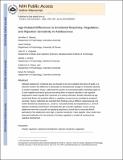| dc.contributor.author | Silvers, Jennifer A. | |
| dc.contributor.author | McRae, Kateri | |
| dc.contributor.author | Gross, James J. | |
| dc.contributor.author | Remy, Katherine A. | |
| dc.contributor.author | Ochsner, Kevin N. | |
| dc.contributor.author | Gabrieli, John D. E. | |
| dc.date.accessioned | 2017-11-09T18:56:03Z | |
| dc.date.available | 2017-11-09T18:56:03Z | |
| dc.date.issued | 2012-12 | |
| dc.identifier.issn | 1931-1516 | |
| dc.identifier.issn | 1528-3542 | |
| dc.identifier.uri | http://hdl.handle.net/1721.1/112163 | |
| dc.description.abstract | Although adolescents’ emotional lives are thought to be more turbulent than those of adults, it is unknown whether this difference is attributable to developmental changes in emotional reactivity or emotion regulation. Study 1 addressed this question by presenting healthy individuals aged 10–23 with negative and neutral pictures and asking them to respond naturally or use cognitive reappraisal to down-regulate their responses on a trial-by-trial basis. Results indicated that age exerted both linear and quadratic effects on regulation success but was unrelated to emotional reactivity. Study 2 replicated and extended these findings using a different reappraisal task and further showed that situational (i.e., social vs. nonsocial stimuli) and dispositional (i.e., level of rejection sensitivity) social factors interacted with age to predict regulation success: young adolescents were less successful at regulating responses to social than to nonsocial stimuli, particularly if the adolescents were high in rejection sensitivity. Taken together, these results have important implications for the inclusion of emotion regulation in models of emotional and cognitive development. | en_US |
| dc.description.sponsorship | National Science Foundation (U.S.) (Award BCS-0224342) | en_US |
| dc.description.sponsorship | National Institutes of Health (U.S.) (Award MH076137) | en_US |
| dc.description.sponsorship | National Institutes of Health (U.S.) (Award HD069178) | en_US |
| dc.description.sponsorship | National Institutes of Health (U.S.) (Award MH094056) | en_US |
| dc.language.iso | en_US | |
| dc.publisher | American Psychological Association (APA) | en_US |
| dc.relation.isversionof | http://dx.doi.org/10.1037/a0028297 | en_US |
| dc.rights | Creative Commons Attribution-Noncommercial-Share Alike | en_US |
| dc.rights.uri | http://creativecommons.org/licenses/by-nc-sa/4.0/ | en_US |
| dc.source | PMC | en_US |
| dc.title | Age-related differences in emotional reactivity, regulation, and rejection sensitivity in adolescence | en_US |
| dc.type | Article | en_US |
| dc.identifier.citation | Silvers, Jennifer A. et al. “Age-Related Differences in Emotional Reactivity, Regulation, and Rejection Sensitivity in Adolescence.” Emotion 12, 6 (2012): 1235–1247 © 2012 American Psychological Association | en_US |
| dc.contributor.department | Massachusetts Institute of Technology. Department of Brain and Cognitive Sciences | en_US |
| dc.contributor.mitauthor | Gabrieli, John D. E. | |
| dc.relation.journal | Emotion | en_US |
| dc.eprint.version | Author's final manuscript | en_US |
| dc.type.uri | http://purl.org/eprint/type/JournalArticle | en_US |
| eprint.status | http://purl.org/eprint/status/PeerReviewed | en_US |
| dspace.orderedauthors | Silvers, Jennifer A.; McRae, Kateri; Gabrieli, John D. E.; Gross, James J.; Remy, Katherine A.; Ochsner, Kevin N. | en_US |
| dspace.embargo.terms | N | en_US |
| dc.identifier.orcid | https://orcid.org/0000-0003-1158-5692 | |
| mit.license | OPEN_ACCESS_POLICY | en_US |
| mit.metadata.status | Complete | |
